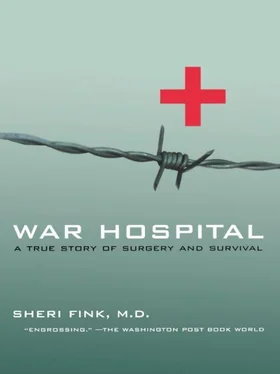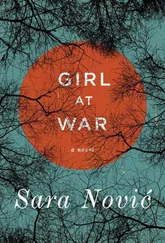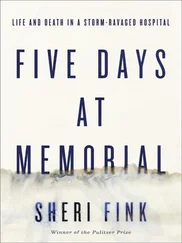He no longer considered himself a humanitarian as he had in Iraq and Chad. Here, in this place of extreme violence and sophisticated hospitals full of experienced surgeons and nurses, there was no space for a goodwilled doctor with basic medical knowledge. No space at all. Here, he would have to become an activist.
His anxiety evaporated, replaced by a calm serenity. He believed his life had just changed. It had taken a direction.
Over the following weeks, the sun disappeared from the Belgrade sky and the temperature sank. Every day Eric and an MSF administrator tried to gain official access papers to Vukovar, hoping to negotiate a ceasefire, bring medical supplies to the hospital, and carry out the planned evacuation. They chased from one government office to another where Communist-style apparatchiks happily clinked glasses of the plum brandy they kept in their cabinets, but refused to so much as direct them to those in charge of access to the ratna zona . At last a functionary offered the name of a top general, but they never made it past his secretary. After numerous office visits and phone calls, they garnered only a threat: Call once again and I’ll toss you in prison. Delegates of the International Committee of the Red Cross (ICRC) faced similar frustrations in their negotiations for access to Vukovar.
In late October, as conflict had broadened throughout the Republic of Croatia, the U.N. secretary-general again designated the United Nations High Commissioner for Refugees, UNHCR, as the “lead agency” to coordinate humanitarian assistance in an internal conflict zone. Because the UNHCR had managed the large aid effort in northern Iraq earlier in the year, it was the obvious agency to task with the difficult and unfamiliar job of providing aid to besieged or displaced people who, because they hadn’t crossed international borders, lacked the official status of refugees.
Eric Dachy, though, had already realized that aid was a secondary concern to the people in Vukovar. Radio news reported intense shelling of civilian areas. Even the hospital had been hit. Noncombatants were suffering and dying because they were being targeted.
When UNHCR Belgrade convened a meeting of aid workers from the principal international organizations, Eric led the charge. He was a doctor, not a politician or a top-ranking U.N. official. But, like his MSF forebears who had witnessed the failed aid operations in Biafra, he burned to take control of the situation and make it right. And he believed that through MSF he could.
“This massacre should be stopped!” he cried out at the meeting, sure that his colleagues would agree.
But a representative from the ICRC blithely pointed out that the granddaddy of humanitarianism, the founder of the Red Cross himself, Henri Dunant, had done his good deeds for the wounded on the battlefield of Solferino, Italy, after the battle was over.
The others concurred. Perhaps they had been around the block once too often and grown accustomed to war’s outrages. As humanitarians, international law gave them the duty and right to improve the lot of civilians and other noncombatants in conflicts. They were doing their best to achieve this. They could not stop the war or enforce the international laws that prohibit the disproportionate targeting of civilians during wartime. That was a task for states, not aid workers.
Eric wondered whether he lived in the same world as these fatalists who shrugged and asked, “What more can we do?” How could they be so unconcerned? He left the meeting feeling alone in the urgency of his worry for the estimated 15,000 to 20,000 civilians trapped in Vukovar.
On November 5, 1991, the presidents of Yugoslavia’s six republics signed the Hague Statement on Respect of Humanitarian Principles. In it, the leaders agreed that “wounded and ill persons must be helped and protected in all circumstances, all arrested persons, and notably combatants who have surrendered, must be treated with humanity,” and they promised “unconditional support for the action of the ICRC in favour of the victims.”
The shelling and bombardment of Vukovar’s civilians, however, continued. Neither MSF nor the ICRC gained permission to aid the wounded. Less than two weeks after the humanitarian declaration, on November 18, 1991, Vukovar fell to the Yugoslav National Army and to local Serb nationalist soldiers. Eric Dachy raced to get there, and not only to deliver the needed medical supplies. The spirited director of Vukovar’s hospital had become a hero of the Croatian resistance. Journalists broadcast her descriptions of suffering at the hospital as it was repeatedly targeted by heavy artillery and critical supplies such as anesthetics ran dry. Eric had an inkling that as an international, his presence might protect her and her colleagues from attacks of vengeance.
Despite his efforts, soldiers stymied him for an additional two days before promising to let him through on the morning of November 20. He left at dawn for Vukovar with a colleague and a translator. At the last military checkpoint before the city, he came across a frantic International Red Cross worker, arriving after the battle, like his predecessor, Henri Dunant, but looking mightily distressed. Gesturing wildly as he spoke to a group of soldiers at the checkpoint, he barely seemed to notice Eric. After a delay, soldiers permitted the MSF and Red Cross teams to cross the checkpoint and drive toward the city. In a few miles, a tapestry of destruction that rivaled Guernica unfolded.
Eric peered out at the city around him. It looked like the moon. So desolate. Even the air seemed to be afraid of what had happened.
He bumped along the pitted road, sandwiched between ruined buildings perforated by thousands of bullets, ripped by shells. Empty window frames jutted at strange angles, an occasional curl of smoke the only movement inside, an occasional red glow of fire the only color. Gray, broken trees leaned over the road, branches splayed at odd angles, their few dead leaves unsettled by the breeze. Dog and pig carcasses littered the ground next to cars flattened by tanks.
It seemed surreal to Eric. This, he thought, was a city in the middle of civilization, in the middle of Europe! It was completely destroyed.
They drove slowly in silence. Eric noticed the body of a small man wearing a cap, curled up on the side of the road as if he was asleep. For a moment, he allowed himself to imagine the man’s fight for life under siege, to wonder who he was, how he died, and why he put on his hat today. Eric wished they could stop, wake him up, and tell him that his suffering was over.
At the hospital, Serb militiamen stood outside wearing long beards in the style—Eric was informed—of Chetniks, World War II anti-Croat, anti-Communist fighters loyal to the Serb king, themselves emulating Serb warriors who fought against the Ottomans. Eric noticed shell craters on the exterior of the hospital, and when he went inside, he found its upper floors deserted. Patients huddled in the basement and several anti-atomic shelters, for two months the only usable parts of a hospital constantly under fire. In spite of the conditions, the medical staff had somehow managed to keep the patients’ bandages clean.
The ICRC had reached agreement with the Yugoslav National Army and Croatian authorities to “neutralize” the hospital—take control of it as a protected object under international law—and undertake an evacuation. But the previous evening, soldiers had removed the aid workers from the hospital and begun to evacuate the patients themselves. Eric looked around for doctors and nurses, but saw none. Someone told him Serb soldiers had arrested the medical workers after accusing them of experimenting on Serb patients. Eric sent his translator to ask the patients what they had seen and heard. The translator returned and whispered that soldiers had earlier arrested and taken away dozens of those sheltering in the hospital.
Читать дальше












